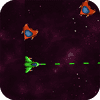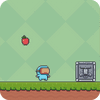The Ouya Dared To Imagine An Independent Game Console
Today, June 25, 2023, marks ten years since the release of the Ouya. The following is an examination of its history as a system that dared to enter a market in an unorthodox fashion.
The Ouya was ahead of its time and behind the times in the same way that many defunct console hacks were. The Ouya, a self-contained gaming console funded in part by a massive Kickstarter campaign, was released 10 years ago today. There were many worries, complaints, and problems, but there was also excitement about the new possibilities this console may open up. What might a community dedicated to developing and playing on its own consoles come up with?
The Ouya was an Android-based mini-console that retailed for $99. Every console shipped was also a development set, and that was part of the sales pitch. Video game development for the platform could ostensibly be initiated by anyone with a passing familiarity with technology. The console promised to unite the mobile and console industries by providing access to design tools and a collection of unique indies.
Ian Bogost, a scholar who spoke out against the Ouya before it was released, said that the console’s attraction lies not in the device itself but in “the home entertainment worth of revealing your support for such a theoretical console… the enjoyment of taking part in theoretical disturbance suffices.” The Ouya’s release was met with lacklustre enthusiasm. The console failed, Razer bought it, and it died a slow, painful death. The Ouya was once among the most-funded Kickstarter projects of all time, but it has since fallen out of favour and been overshadowed by other, larger projects. Bogost was, to a degree, correct. The Ouya failed because its purpose had been met long before it was sold.
The Ouya’s pitch is fantastic, and that’s just from seeing the first Kickstarter video. Disrupting the market with mobile video games at the theatre, letting the little designers join in on the fun with the big ones. This little device contains the future. Packaging for the original Ouya consoles had inserts with slogans like “therefore begins the transformation” and “thank you for thinking.”
The Ouya’s portability was its strongest suit. Although the developers’ original plan to cause widespread disruption was ultimately unsuccessful, they were successful in creating a low-cost, open-source environment for out-there creations. Zack Kotzer wrote a heartfelt and humorous post for the deceased gaming website Killscreen, praising Ouya as a great source of video games to enjoy when stoned. He’s talking about games like “drip simulators,” “space sail simulators,” and “ridiculous valet parking simulators” that are already what they claim to be.
The Ouya’s biggest hit, Towerfall, a multiplayer fighting game, is a microcosm of the system’s limitations. At the time of the game’s release, the lack of online multiplayer was the most often voiced complaint. Towerfall is a video game that can fill a room with its players’ shrieks of terror, shouts at the screen, and roars of laughter. This feeling may be captured in a well-populated multiplayer lobby, but online gaming offers more variety. The true power of Towerfall is in the crazed intrigue it provides over the course of a weekend and an occasional match in the years that follow. Towerfall, unlike nearly all other major multiplayer games on the market right now, will not take over your life if you let it. It has a small conceptual footprint, much like the Ouya.
While Ouya’s platform allowed for relatively few things and it did produce a number of development courses, its intended audience was somewhat larger. The Ouya team launched a $1 million funding project shortly after the console’s debut. Ouya has indicated that it will match the financial contributions of independent developers dollar for dollar in exchange for an exclusive window of six months. Some designers were accused of artificially boosting their Kickstarters in order to reach the guaranteed funds, therefore the approach was met with scepticism. Designer input resulted in changes to the policy. It also showed how lofty Ouya’s goals were. The game was a series of indie strikes in the vein of Super Meat Boy or maybe Towerfall. Smaller and smaller video games clogged the aisles of the Ouya shop, but they received less support from the company. The warning that Kotzer wrote, “much better anarchy than antiquity,” has come true.
Even more tragically, the Ouya tended to keep to themselves. When it became clear that its online environment was going offline, preservationists moved quickly to save the games that would otherwise be lost when the service went dark. The Ouya did marginally better than Dreams, Game Builder Garage, and Mario Maker since it was built on Android architecture. Android is not as narrow or closed an environment. It’s not like nothing was destroyed or abandoned when it fell.
The computer, oddly enough, has occupied the space that the Ouya had claimed. The Steam Deck and the ROG Ally are two examples of portable computers that are straightforward to set up. There are now more people than ever before who use a personal computer or laptop for work or study. Itch.io, a website and desktop client that debuted just months before the Ouya, is currently the ideal way for anyone to distribute their games, participate in a video game jam, or simply take in the weird, broken, and spectacular (yes, even while high). We are still dealing with the cultural factors that gave rise to the Ouya and that it helped shape.
One key differential is that the price of a computer, even a cheap one, can easily exceed the price of an Ouya. An Ouya may currently be purchased for $50 to $200 on eBay. Another distinction is that, with a few notable exceptions, virtually every desktop computer model is produced by major hardware corporations. The Ouya was supported by institutions but was conceptually its own console. It’s also important to remember that the Steam Deck is just the latest and most successful in a long line of attempts by Valve to rob hardware production. Valve has so much money that it can afford to fail countless times until it hits on anything that succeeds. The Ouya could fail to do so. The dream of a truly decentralised video gaming console is further away than it has ever been. The Playdate, a direct competitor to the Ouya, targets a much narrower audience.
Video games have an unstable consumer base. The market can’t just scale upward indefinitely due to issues like ecological impact, labour conditions, and the magnitude of high-budget jobs, despite the hopes of CEOs and studio heads. The Ouya’s biggest flaw was perhaps the lofty goals it set for itself. Perhaps its popularity was due to its laying the groundwork for a new kind of online gaming community. The Ouya is hardly the only tiny console that failed to live up to its ambitions. The Ouya, like the aforementioned gaming consoles, suggests other timelines and possibilities. You can now connect your hacked Ouya to a fresh, user-run server for game downloads and play. A small, self-governing, and active part of history. I really hope more people will join in on that.
Google+ profile of Grace Benfell
Each of the topics discussed here was hand-picked by our editors. If you make a purchase after clicking on one of our links, GameSpot may receive compensation.

























